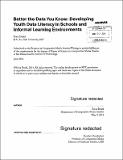| dc.contributor.advisor | Heather Hendershot. | en_US |
| dc.contributor.author | Deahl, Erica (Erica Sachiyo) | en_US |
| dc.contributor.other | Massachusetts Institute of Technology. Department of Comparative Media Studies. | en_US |
| dc.date.accessioned | 2014-09-19T21:31:08Z | |
| dc.date.available | 2014-09-19T21:31:08Z | |
| dc.date.copyright | 2014 | en_US |
| dc.date.issued | 2014 | en_US |
| dc.identifier.uri | http://hdl.handle.net/1721.1/89958 | |
| dc.description | Thesis: S.M., Massachusetts Institute of Technology, Department of Comparative Media Studies, 2014. | en_US |
| dc.description | Cataloged from PDF version of thesis. | en_US |
| dc.description | Includes bibliographical references (pages 115-119). | en_US |
| dc.description.abstract | We live in an era of unprecedented growth in the use and impact of data. While large institutions are using data about individuals to drive decision-making, small organizations and civic hackers are using open and public data to innovate for social good. Meanwhile, the educational and informational resources to enable individuals to understand this data remain scarce. Individuals and communities are often unaware of the data being collected about them, the data they are contributing, and the ways in which that data is being used. Although the Open Data movement has given some individuals a new opportunity to interface with data directly, the public at large lacks the skills and knowledge to take advantage of this opportunity. This thesis argues that we need to support the public - especially youth - in developing data literacy, so that they are equipped to think critically and ethically about data. I make this case in four ways. First, I contextualize the need for data literacy by describing the historical evolution of institutional data collection practices, contemporary uses of data that have had a profound impact on institutions and individuals, and the potentially problematic consequences of data modeling. Second, I propose a definition of "data literacy," situate the concept within the landscape of new media literacies, and describe settings, methodologies, and tools that can be used to support it. Third, I analyze two data literacy initiatives that enable youth to use data to investigate and address real-world issues: one in an informal learning environment, Young Rewired State's Festival of Code, and the other in a public school, City Digits: Local Lotto. Fourth, I analyze the challenges facing data literacy initiatives - from the constraints of the public school environment, to the challenges of reaching diverse audiences and supporting open-ended learning. I propose three design principles to guide researchers, educators, and practitioners in shaping future data literacy initiatives. | en_US |
| dc.description.statementofresponsibility | by Erica Deahl. | en_US |
| dc.format.extent | 119 pages | en_US |
| dc.language.iso | eng | en_US |
| dc.publisher | Massachusetts Institute of Technology | en_US |
| dc.rights | M.I.T. theses are protected by copyright. They may be viewed from this source for any purpose, but reproduction or distribution in any format is prohibited without written permission. See provided URL for inquiries about permission. | en_US |
| dc.rights.uri | http://dspace.mit.edu/handle/1721.1/7582 | en_US |
| dc.subject | Comparative Media Studies. | en_US |
| dc.title | Better the data you know : developing youth data literacy in schools and informal learning environments | en_US |
| dc.type | Thesis | en_US |
| dc.description.degree | S.M. | en_US |
| dc.contributor.department | Massachusetts Institute of Technology. Program in Comparative Media Studies/Writing | en_US |
| dc.identifier.oclc | 890128897 | en_US |
